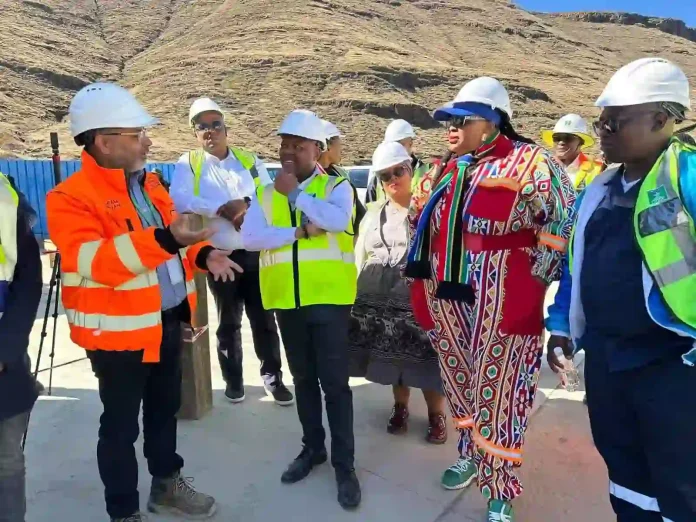
As published by Ntombi Nkosi in the African Times
The governments of South Africa and Lesotho have moved to reassert their commitment to the Lesotho Highlands Water Project (LHWP) Phase II, pledging tighter oversight, stronger governance, and faster community benefits amid mounting concerns about delays and escalating costs.
Become an insider. Subscribe to our newsletter for more top trending stories like this!
In a joint communiqué released after a two-day oversight mission to the project, Lesotho’s Minister of Natural Resources, Mohlomi Moleko, and South Africa’s Minister of Water and Sanitation, Pemmy Majodina, said the project remains a cornerstone of bilateral cooperation and an anchor for the water and energy security of both nations.
The mission took place on 20–21 August 2025, supported by South African Deputy Ministers David Mahlobo and Sello Seitholo, along with High Commissioner to Lesotho, Constance Seoposengwe.
The ministers described the visit as a crucial exercise in accountability: “The purpose of our joint visit was to gain a detailed and critical understanding of the status of the project, review progress on key infrastructure components, and assess the challenges impeding timely delivery and implementation,” the communiqué read.
The LHWP was first established under a 1986 treaty between the two countries, designed to harness Lesotho’s abundant mountain water resources to supply South Africa’s industrial heartland while generating hydropower for the Kingdom.
Phase I of the project, which included the Katse and Mohale Dams, has long been hailed as one of Africa’s most ambitious engineering feats. Phase II, now under construction, involves building the Polihali Dam and a major transfer tunnel, expected to increase annual water supply to South Africa by an additional 490 million cubic metres while significantly boosting Lesotho’s power generation capacity.
Yet, despite its promise, the project has been beset by procurement disputes, governance concerns, and construction delays – frustrations that the ministers now say can no longer be tolerated.
One of the major outcomes of the joint mission is a commitment to quarterly site visits at the ministerial level starting in December 2025. The aim is to ensure that implementation bottlenecks are resolved without delay and that oversight institutions are held accountable.
“We jointly commit to ensuring that oversight bodies and project implementing authorities, particularly the Lesotho Highlands Water Commission (LHWC), the Lesotho Highlands Development Authority (LHDA), and the Project Management Unit, are held accountable through better contract management, improved governance, and stronger institutional performance,” the ministers declared.

The communiqué also welcomed commitments from the LHWC, LHDA, and South Africa’s Trans-Caledon Tunnel Authority (TCTA) to implement a turnaround strategy and deliver Phase II to “the highest standards of excellence.”
The joint statement placed significant emphasis on the welfare of communities directly affected by the project – an issue that has long been a flashpoint in Lesotho.
“Communities are at the centre of the LHWP. We urge the project implementing authorities and oversight bodies to prioritise the beneficiation of directly affected communities through adequate and timely compensation, resettlement, skills development, livelihoods programmes, and access to water by communities surrounding the project,” the communiqué said.
Civil society organisations in Lesotho have previously criticised the project for displacing rural families and disrupting traditional livelihoods without delivering sufficient compensation. By stressing compensation and development, the two governments appear to be directly addressing those grievances.
The ministers further encouraged both countries to maximise the project’s economic spin-offs, including fisheries, irrigation, and tourism development, ensuring that water resources serve as a broader driver of socio-economic growth.
Become an insider. Subscribe to our newsletter for more top trending stories like this!
While both governments reaffirmed their commitment to the project, they did not shy away from acknowledging its challenges.
“We are concerned about Phase II delays and cost escalations. We call upon oversight bodies, implementing authorities, and project managers to hold contractors to the highest standards of performance,” the ministers warned.
The delays have become increasingly critical for South Africa, where water demand in Gauteng – home to more than 15 million people and the country’s industrial hub – continues to rise. For Lesotho, the project represents both a revenue stream and a foundation for long-term energy security.

The communiqué underscored that both governments’ top leadership is fully behind the project. President Cyril Ramaphosa and Prime Minister Samuel Ntsokoane Matekane have directed the ministers to ensure that the LHWP stays on track.
To that end, Moleko and Majodina announced that negotiations to review and revise the 1986 Treaty under Article 18 will commence without further delay. This review aims to modernise the legal framework, address emerging challenges such as climate change, and strengthen governance structures.
For both governments, the LHWP is more than a water and power project – it is a symbol of regional partnership and mutual dependence.
“We reaffirm our shared commitment to the timely completion of the LHWP Phase II in all its facets, recognising that it is an anchor for the two countries’ water security, energy security, and climate action,” the ministers said.
They pledged vigilant oversight to ensure that the project delivers “lasting benefits for the people of Lesotho and South Africa and stands as a symbol of partnership and progress for generations to come.”
Analysts say the joint statement is a significant step towards restoring confidence in the project after months of speculation about delays and mismanagement. The commitments to quarterly oversight visits, stronger governance, and community prioritisation suggest a more hands-on approach by both governments.
But the real test will come in implementation. With Gauteng’s water supply under pressure and Lesotho’s development hopes tied to the project’s success, both governments face mounting pressure to deliver on their promises.
For now, the message from Maseru and Pretoria is clear: the Lesotho Highlands Water Project Phase II will go ahead – and this time, accountability will be at the centre of its delivery.
This article has been published in partnership with the African Times.
Become an insider. Subscribe to our newsletter for more top trending stories like this!




